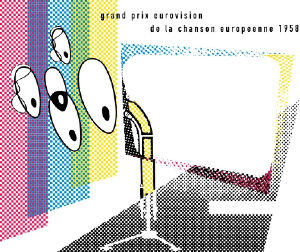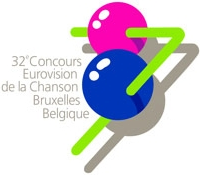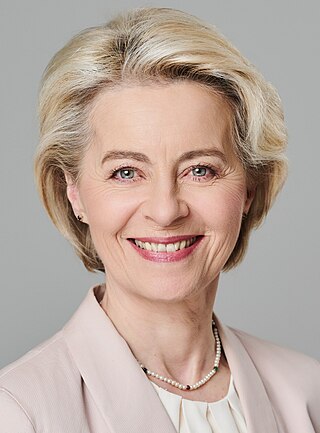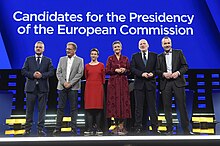
The European Broadcasting Union is an alliance of public service media organisations whose countries are within the European Broadcasting Area or who are members of the Council of Europe. As of 2024, it is made up of 123 member organisations from 56 countries, and 31 associate members from a further 20 countries. It was established in 1950, and has its administrative headquarters in Geneva.

The Eurovision Song Contest 1956 was the first edition of the annual Eurovision Song Contest, organised by the European Broadcasting Union (EBU) and host broadcaster Radio svizzera italiana (RSI) on behalf of the Swiss Broadcasting Corporation. The contest, originally titled the Gran premio Eurovisione 1956 della canzone europea, was held on 24 May 1956 at the Teatro Kursaal in Lugano, Switzerland, and hosted by Swiss television presenter Lohengrin Filipello, which remains the only time that the contest has been hosted by a solo male presenter.

The Eurovision Song Contest 1957 was the second edition of the annual Eurovision Song Contest. Organised by the European Broadcasting Union (EBU) and host broadcaster Hessischer Rundfunk (HR) on behalf of ARD, the contest, originally known as the Grand Prix Eurovision de la Chanson Européenne 1957 was held on Sunday 3 March 1957 and was hosted at the Großer Sendesaal des hessischen Rundfunks in Frankfurt, West Germany by German actress Anaid Iplicjian.

The Eurovision Song Contest 1958 was the third edition of the annual Eurovision Song Contest. Organised by the European Broadcasting Union (EBU) and host broadcaster Nederlandse Televisie Stichting (NTS), the contest, originally known as the Grand Prix Eurovision de la Chanson Européenne 1958 was held on Wednesday 12 March 1958 at the AVRO Studios in Hilversum, the Netherlands and hosted by Dutch television presenter Hannie Lips. This marked the first time that the contest was hosted in the country of the preceding year's winner, a tradition that has been continued ever since.

The Eurovision Song Contest 2003 was the 48th edition of the Eurovision Song Contest. It took place in Riga, Latvia, following the country's victory at the 2002 contest with the song "I Wanna" by Marie N. Organised by the European Broadcasting Union (EBU) and host broadcaster Latvijas Televīzija (LTV), the contest was held at the Skonto Hall on 24 May 2003. The contest was presented by last year's winner Marie N and former contestant Renārs Kaupers.

The Eurovision Song Contest 1995 was the 40th edition of the Eurovision Song Contest, held on 13 May 1995 at the Point Theatre in Dublin, Ireland. Organised by the European Broadcasting Union (EBU) and host broadcaster Radio Telefís Éireann (RTÉ), and presented by Mary Kennedy, the contest was held in Ireland following the country's victory at the 1994 contest with the song "Rock 'n' Roll Kids" by Paul Harrington and Charlie McGettigan. It was the third consecutive contest to be held in Ireland – the first and only time in the history of the event that a country has hosted three editions in a row – and the second consecutive edition to be held in the Point Theatre in Dublin.

The Eurovision Song Contest 1994 was the 39th edition of the Eurovision Song Contest, held on 30 April 1994 at the Point Theatre in Dublin, Ireland. Organised by the European Broadcasting Union (EBU) and host broadcaster Radio Telefís Éireann (RTÉ), and presented by Cynthia Ní Mhurchú and Gerry Ryan, the contest was held in Ireland following the country's victory at the 1993 contest with the song "In Your Eyes" by Niamh Kavanagh. It was the first time that any country had hosted two successive editions of the contest, following the previous year's contest held in Millstreet.

The Eurovision Song Contest 1993 was the 38th edition of the Eurovision Song Contest, held on 15 May 1993 at the Green Glens Arena in Millstreet, Ireland. Organised by the European Broadcasting Union (EBU) and host broadcaster Radio Telefís Éireann (RTÉ), and presented by Fionnuala Sweeney, the contest was held in Ireland following the country's victory at the 1992 contest with the song "Why Me?" performed by Linda Martin.

The Eurovision Song Contest 1987 was the 32nd edition of the annual Eurovision Song Contest. It took place in Brussels, Belgium, following the country's victory at the 1986 contest with the song "J'aime la vie" by Sandra Kim. Organised by the European Broadcasting Union (EBU) and host broadcaster Radio-télévision belge de la Communauté française (RTBF), the contest was held at the Centenary Palace on 9 May 1987 and hosted by French-Belgian singer Viktor Lazlo.

The Eurovision Song Contest 1985 was the 30th edition of the Eurovision Song Contest, held on 4 May 1985 in the Scandinavium in Gothenburg, Sweden. Organised by the European Broadcasting Union (EBU) and host broadcaster Sveriges Television (SVT), it was presented by Lill Lindfors. The contest was held in Sweden following the country's victory at the 1984 contest with the song "Diggi-Loo Diggi-Ley" by Herreys. Nineteen countries participated in the contest; Greece and Israel returned after a one-year absence, while the Netherlands and Yugoslavia, which had participated in the previous year's event, declined to enter due to separate memorial events in those countries coinciding with the date of the contest.

The Eurovision Song Contest 1988 was the 33rd edition of the Eurovision Song Contest, held on 30 April 1988 in the RDS Simmonscourt Pavilion in Dublin, Ireland and presented by Pat Kenny and Michelle Rocca. Organised by the European Broadcasting Union (EBU) and host broadcaster Radio Telefís Éireann (RTÉ), the contest was held in Ireland following the country's victory at the 1987 contest with the song "Hold Me Now" by Johnny Logan.

The Eurovision Song Contest 1984 was the 29th edition of the Eurovision Song Contest, held on 5 May 1984 in the Théâtre Municipal in Luxembourg City, Luxembourg. Organised by the European Broadcasting Union (EBU) and host broadcaster Radio Télévision Luxembourg (RTL), the contest was held in Luxembourg following the country's victory at the 1983 contest with the song "Si la vie est cadeau" by Corinne Hermès. The event was presented by Désirée Nosbusch, who, at 19 years old, remains the youngest person to have hosted the contest as of 2024.

The Eurovision Song Contest 1996 was the 41st edition of the Eurovision Song Contest, held on 18 May 1996 at the Oslo Spektrum in Oslo, Norway. Organised by the European Broadcasting Union (EBU) and host broadcaster Norsk rikskringkasting (NRK) and presented by Ingvild Bryn and Morten Harket, the contest was held in Norway following the country's victory at the 1995 contest with the song "Nocturne" by Secret Garden.

The Eurovision Song Contest 1997 was the 42nd edition of the annual Eurovision Song Contest, held on 3 May 1997 at the Point Theatre in Dublin, Ireland. Organised by the European Broadcasting Union (EBU) and host broadcaster Radio Telefís Éireann (RTÉ) and presented by Carrie Crowley and Ronan Keating, the contest was held in Ireland following the country's victory at the 1996 contest with the song "The Voice" by Eimear Quinn. The 1997 contest was the seventh – and to date last – edition to be staged in Ireland, as well as the fourth to be produced by RTÉ in five years. The Point Theatre served as the host venue for the third time, following the 1994 and 1995 contests, becoming the only venue to have been the site of three Eurovision Song Contests.
Eurovision is a pan-European television telecommunications network owned and operated by the European Broadcasting Union (EBU). It was founded in 1954 in Geneva, Switzerland, and its first official transmission took place on 6 June 1954. However, a year before the official launch, on 2 June 1953 the coronation of Elizabeth II was one of the first events to be broadcast across Europe.
Switzerland participated in the Eurovision Song Contest 2016 with the song "The Last of Our Kind" written by Christina Maria Rieder, Mike James, Jeff Dawson and Warne Livesey. The song was performed by Rykka, which is the artistic name of singer Christina Maria Rieder. The Swiss entry for the 2016 contest in Stockholm, Sweden was selected through the national final ESC 2016 – die Entscheidungsshow, organised by the Swiss German speaking broadcaster Schweizer Radio und Fernsehen (SRF) in collaboration with the other broadcasters part of the Swiss Broadcasting Corporation. Artists that were interested in entering the Swiss national final had the opportunity to apply to one of three open selections with defined submission periods organised by SRF together with the Swiss-Romansh broadcaster Radiotelevisiun Svizra Rumantscha (RTR), the Swiss-French broadcaster Radio Télévision Suisse (RTS) and/or the Swiss-Italian broadcaster Radiotelevisione svizzera (RSI). A total of 19 entries were selected to advance to an "Expert Check" round; ten entries were selected from the SRF/RTR selection, six entries were selected from the RTS selection and three entries were selected from the RSI selection. The "Expert Check" was held on 6 December 2015 and involved four experts evaluating the live performances of the 19 entries and selecting six entries to advance to the televised national final—three artists and songs from the SRF/RTR candidates, two from the RTS candidates and one from the RSI candidates. The six finalists performed during the national final on 13 February 2016 where a combination of jury voting and public voting ultimately selected "The Last of Our Kind" performed by Rykka as the winner.

Eurovision Choir of the Year 2017 was the first Eurovision Choir competition for choral singers, which was organised by the European Broadcasting Union (EBU) and Interkultur. It was held on 22 July 2017, at the Arena Riga, in the Latvian capital, Riga. The event was produced by Latvian host broadcaster Latvijas Televīzija (LTV) and the Riga Tourism Development Bureau.

The 2024 European Parliament election was held in the European Union (EU) between 6 and 9 June 2024. It was the tenth parliamentary election since the first direct elections in 1979, and the first European Parliament election after Brexit. A total of 720 Members of the European Parliament (MEPs) were elected to represent more than 450 million people from 27 member states. This election also coincided with a number of other elections in some European Union member states.
Latvia participated in the Eurovision Song Contest 2023 in Liverpool, United Kingdom, with "Aijā" performed by Sudden Lights. The Latvian broadcaster Latvijas Televīzija (LTV) organised the national final Supernova2023 in order to select the Latvian entry for the contest. 14 songs were selected to compete in the national final, which consisted of two shows: a semi-final and a final. In the semi-final on 4 February 2023, ten entries were selected to advance to compete in the final on 11 February 2023 where a public televote and an eight-member jury panel selected "Aijā" performed by Sudden Lights as the winner.
















